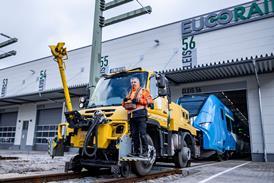- News
- In depth
- Events
- Data
- Maps
- Tenders & Jobs
 Tender 42230 - Supply of Forklifts and Reachstacker for ISR’s Cargo Division
Tender 42230 - Supply of Forklifts and Reachstacker for ISR’s Cargo Division Timetabling & Track Possession System (“Tender”)
Timetabling & Track Possession System (“Tender”) Request for Information (RFI) Concerning “Flatcars for Transporting Refrigerated Containers”
Request for Information (RFI) Concerning “Flatcars for Transporting Refrigerated Containers” Pre-Qualification Process 589/2025 INVITATION TO PARTICIPATE IN A PARTICPANTS’ CONFERENCE
Pre-Qualification Process 589/2025 INVITATION TO PARTICIPATE IN A PARTICPANTS’ CONFERENCE
- Sponsored content
- Insights
Close menu
- Home
-
News
- Back to parent navigation item
- News
- Traction and rolling stock
- Passenger
- High speed
- Freight
- Infrastructure
- Policy
- Technology
- Ticketing
- Business
- Research, training and skills
- Accessibility and inclusion
- People
- Urban rail news
- Suburban and commuter rail
- Metro
- Light rail and tram
- Monorail and peoplemover
- Regions
- InnoTrans
- In depth
- Events
- Data
- Maps
- Tenders & Jobs
- Sponsored content
- Insights
Keep the railway affordable
By Railway Gazette International and Peter Badcock2008-11-25T08:00:00

PRICING: Whilst the rail sector was trying not to talk itself into recession, the underlying message from industry leaders at InnoTrans 2008 was the need to keep tight control on costs and prices. Peter Badcock reports from Berlin.
Already have an account? LOG IN
To continue…
You’ve reached your limit of content for the month










